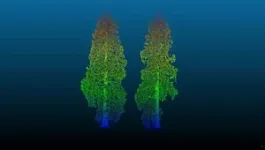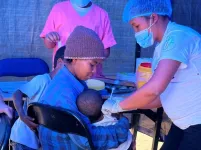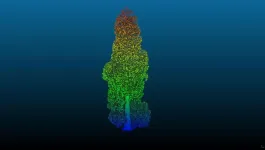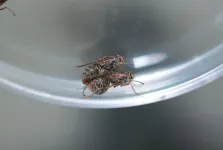(Press-News.org) Cancer patients who received specialized mental health support as part of their treatment plan are more likely to see improvements in their quality of life and reductions in pain, depression and fatigue, according to a study led by researchers at the University of Pittsburgh School of Medicine.
In addition to lasting improvements in patients’ quality of life, researchers observed lower risk of cardiovascular disease in family caregivers, as well as substantial cost savings to the healthcare system. The findings from a Phase III clinical trial were published today in The Lancet.
“The current standard of care, which includes screening patients for these symptoms and referring them to a provider for treatment, is not working,” said lead author of the study Jennifer Steel, Ph.D., professor of surgery, psychiatry and psychology at Pitt. “Our integrated screening and treatment program provides meaningful support to patients and can save hospitals millions of dollars by preventing readmissions.”
Numerous studies have shown that symptoms such as depression and pain are associated with higher rates of emergency room visits and readmissions to the hospital, higher health care costs and poorer survival. For nearly two decades, screening for these symptoms and referral for treatment has become standard of care for cancer centers in the U.S., Canada, Europe and Australia. Yet, various barriers prevent the majority of patients from initiating treatment. Steel and her team wanted to change that.
Out of 459 participants in the Phase III trial that was run at UPMC Hillman Cancer Center in Pittsburgh, half was assigned to the integrated screening and stepped collaborative care intervention group and connected with a trained social worker or counselor for weekly Cognitive Behavioral Therapy (CBT) sessions. Those sessions were integrated into the cancer care plan and held weekly for at least eight to 12 weeks via telehealth. Patients were also offered medication treatment if CBT alone did not provide a substantial benefit.
Traditional strategies involved with CBT include identifying and changing automatic thoughts, relaxation techniques, and changing core beliefs about oneself or environment. The CBT sessions also focused on the reduction of pain and fatigue by improving sleep hygiene and increasing physical activity.
At the six-month follow up, patients who were assigned to the stepped collaborative care group had greater improvements in emotional, physical and functional well-being than patients who were referred to a provider in their community for treatment. Importantly, those improvements persisted even one year after the intervention was initiated.
Patients receiving mental health treatment also had fewer emergency room visits and readmissions within 90 days, and shorter hospital stays, thus cutting down on costs to the health care system. The study showed that, even if the collaborative care intervention was offered to patients for free, hospitals may expect to save upward of 4 million dollars for every 250 patients. It is the first U.S.-based collaborative care intervention in the context of cancer to show such cost savings.
“Preserving, or improving, quality of life while undergoing treatment for cancer is our goal, and for some patients, it is as important as survival,” said Steel. “We hope our findings may shift the paradigm in the way in which we screen and treat these symptoms, while at the same time provide meaningful support to patients.”
Additional authors of the study include Charles George, M.S., Lauren Terhorst, Ph.D., Jonathan G. Yabes, Ph.D., Dan P. Zandberg, M.D., Marci Nilsen, Ph.D., Jonas Johnson, M.D., Yoram Vodovotz, Ph.D., Jon Walker, Ph.D., Samer Tohme, M.D., Timothy Billiar, M.D., and David A. Geller, M.D., all of Pitt; Vincent Reyes, M.D., Gauri Kiefer, M.D., Christopher Marsh, M.D., Jason Bierenbaum, M.D., Nishant Tageja, M.D., Michal Krauze, M.D., Robert VanderWeele, M.D., Gaurav Goel, M.D., and Gopala Ramineni, M.D., all of UPMC Hillman Cancer Center, and Michael Antoni, Ph.D., of the University of Miami.
END
A simple intervention benefits cancer patients while saving hospitals money, Pitt study showed
2024-03-13
ELSE PRESS RELEASES FROM THIS DATE:
Major typhoid fever surveillance study in sub-Saharan Africa indicates need for the introduction of typhoid conjugate vaccines in endemic countries
2024-03-13
There is a high burden of typhoid fever in sub-Saharan African countries, according to a new study published today in The Lancet Global Health. This high burden combined with the threat of typhoid strains resistant to antibiotic treatment calls for stronger prevention strategies, including the use and implementation of typhoid conjugate vaccines (TCVs) in endemic settings along with improvements in access to safe water, sanitation, and hygiene.
The findings from this 4-year study, the Severe Typhoid ...
Rice’s Naomi Halas awarded Optica’s C.E.K. Mees Medal
2024-03-13
HOUSTON – (March 13, 2024) – Rice University’s Naomi Halas has been selected as the 2024 recipient of the C.E.K. Mees Medal by Optica for “her design, fabrication, and demonstration of nanoparticles with specific optical and physical properties, the widespread application of which enables advances in fields including cancer therapy, water security, and light-driven chemistry.”
Halas’ groundbreaking work in nanotechnology has enabled the creation of metal nanoparticles possessing structural ...
Giant sequoias are a rapidly growing feature of the UK landscape
2024-03-13
UCL Press Release
Under embargo until Wednesday 13 March 2024, 00:01 UK Time
Imported giant sequoia trees are well adapted to the UK, growing at rates close to their native ranges and capturing large amounts of carbon during their long lives, finds a new study led by UCL researchers with colleagues at the Royal Botanic Gardens, Kew.
The new research, published in Royal Society Open Science, found that the most massive species of redwood trees, Sequoiadendron giganteum, known as the giant sequoia, can potentially pull an average of 85 kilograms of carbon out ...
Who knew that eating poo was so vital for birds’ survival?
2024-03-13
We all know that the early bird gets the worm, but new research shows they turn to something far more nutritious for their breakfast.
Poo – either their own, or from other birds – provides them with essential nutrients, energy, and helps them adapt to new environments and seasonal variations, especially when they are developing.
New research led by the University of South Australia and published in Biological Reviews explains how eating faeces (known as coprophagy) shapes wild birds’ digestive tracts (gut biota), enabling them to absorb lost or deficient nutrients and adjust to seasonal variations in food sources.
This ...
Tsetse fly fertility damaged after just one heatwave, study finds
2024-03-13
The fertility of both female and male tsetse flies is affected by a single burst of hot weather, researchers at the University of Bristol and Stellenbosch University in South Africa have found.
The effects of a single heatwave were even felt in the offspring of heat exposed parents, with more daughters being born than sons.
The study, published today in Proceedings of the Royal Society B, helps explain why tsetse are declining in some parts of their range in Africa and has important implications for the disease they spread, particularly sleeping sickness in humans and nagana in cattle.
Lead author ...
New UAF lidar will add to space weather research capability
2024-03-12
University of Alaska Fairbanks scientists are developing a new light detection and ranging instrument to help gain a better understanding of space weather enveloping Earth.
The new laser radar, or lidar, will be the third for the UAF Geophysical Institute. It will measure temperature and neutrally charged iron in the upper atmosphere at altitudes of 75 to 125 miles, where the mesosphere and thermosphere meet.
Understanding the processes and influences at that altitude has become increasingly important as the proliferation of low-Earth orbit satellites continues and more nations send probes through ...
A simple and robust experimental process for protein engineering
2024-03-12
Image
A protein engineering method using simple, cost-effective experiments and machine learning models can predict which proteins will be effective for a given purpose, according to a new study by University of Michigan researchers.
The method has far-reaching potential to assemble proteins and peptides for applications from industry tools to therapeutics. For instance, this technique can help speed up the development of stabilized peptides for treating diseases in ways that current medicines can't, including improving how exclusively antibodies bind to their targets in immunotherapy.
"The rules that govern how proteins work, from sequence to structure to function, are ...
UTEP researchers to design movement-based training to support local health providers
2024-03-12
EL PASO, Texas (Mar. 12, 2024) – Burnout among health care workers is a well-documented problem that can exacerbate health disparities and limit access to care. Now, researchers at The University of Texas at El Paso are taking a creative approach in their search for a solution – a training program for providers that combines elements of art and science.
The project will examine the impact of a movement-based and somatics cross-training intervention on health care providers in the Paso del ...
Alaska dinosaur tracks reveal a lush, wet environment
2024-03-12
A large find of dinosaur tracks and fossilized plants and tree stumps in far northwestern Alaska provides new information about the climate and movement of animals near the time when they began traveling between the Asian and North American continents roughly 100 million years ago.
The findings by an international team of scientists led by paleontologist Anthony Fiorillo were published Jan. 30 in the journal Geosciences. Fiorillo researched in Alaska while at Southern Methodist University. He is now executive director of the New Mexico Museum of Natural History and Science.
University ...
Study: Best way to memorize stuff? It depends...
2024-03-12
Recent experiments by psychologists at Temple University and the University of Pittsburgh shed new light on how we learn and how we remember our real-world experiences.
The research, described in the March 12 online edition of Proceedings of the National Academy of Sciences (PNAS), suggests that varying what we study and spacing out our learning over time can both be helpful for memory — it just depends on what we’re trying to remember.
“Lots of prior research has shown that learning and ...







